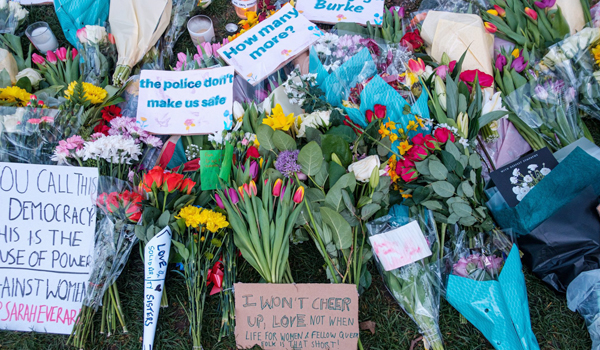Women have less trust in police since Sarah Everard murder, survey suggests
Almost half of women have less trust in the police less since the murder of Sarah Everard, according to a new survey.
Research by YouGov, commissioned by the End Violence Against Women (EVAW) coalition, found 47 per cent of women and 40 per cent of men said trust in the police “had declined” since details of the rape and murder of Ms Everard by serving Metropolitan Police Service (MPS) officer Wayne Couzens were made public.
Three-quarters of women (76 per cent) believe the culture of policing has to change to better respond to violence against women and girls (VAWG).
And one in ten women said they would be less likely to report sexual assault to the police following the Ms Everard case.
The data, based on a poll of 1,699 adults, is released as the Association of Police and Crime Commissioners and the National Police Chiefs’ Council (NPCC) hold a two-day partnership summit in London on how policing can build public trust and improve performance.
Deputy Chief Constable Maggie Blyth, national police lead for VAWG, told delegates that “we won’t move forward… if we don’t make a change and rebuild the trust that we know has been broken by the tragic events in the last few weeks and months”.
The EVAW said the Ms Everard atrocity, and the murder of sisters Bibaa Henry and Nicole Smallman, had propelled “a national conversation about the institutional cultures that underpin and enable police perpetrators to abuse without consequence” with public “outpourings of anger and distress about police failings”.
It prompted a government crackdown on sexual harassment as part of its VAWG strategy, with many forces introducing lone officer verification schemes.
However, the EVAW said these measures “fail to address the causes of VAWG and police-perpetrated abuse”, and come before the “difficult internal work has taken place to critically confront police failings – including the institutionalised racism and misogyny underpinning them”.
In his speech to the partnership summit, NPCC chair Martin Hewitt said recent events would be “a defining moment for policing”.
He said there was a “deeply felt and long-standing concern from women that the criminal justice system does not protect them or bring them justice when they experience violent and sexual crimes that have a devastating impact on their lives”.
Mr Hewitt said: “That concern and desire for change has been brought into sharp focus by the murders of Sarah Everard, of Biba Henry and Nicole Smallman, and of Sabina Nessa.
“Far too many women are asking themselves if the police are on their side in tackling violence against them, and if they can trust us to help them.
“The weekend following the sentencing of Sarah Everard’s murderer, as I took in what that meant for policing, was one of the lowest points in all my years of service, and I’ve no doubt that a similar sentiment was felt by all the decent and hardworking people in policing.
“We can’t claim to police by consent if any community or section of society doesn’t trust us and doesn’t believe in what we are doing.
“So I believe that this is a defining moment for policing. People will look back at how we responded. But more importantly people are looking at us right now.”
Mr Hewitt added: “We must be honest with ourselves that misogynistic attitudes and behaviours that exist in society exist in policing too. And it matters more in policing because of the powers that we hold and because our legitimacy is built on trust and confidence.
“We need to promote, protect and nurture the right culture in policing. All of us need to reflect on how we as individuals demand and support a culture that is inclusive for both our own staff, but also for the people we serve. And we must be more open, more alert to, and more challenging of, behaviour or actions that undermine that culture.
“That means everyone in the service must call out and challenge behaviour that betrays our professional and ethical standards. As leaders, we need to engender a culture that enables and supports all of our people to do just that.
“We also need to take every possible step to root out those who do not uphold our standards”.
Andrea Simon, director of the EVAW, said: “The police and government response to legitimate public outpourings of anger and distress about police failings have fundamentally missed the mark.
“Just over three quarters of women surveyed think that police cultures must change in order to better respond to violence against women and girls, with 65 per cent of people stating the Government should be doing more on this issue.
“However, we are yet to see any commitment and accountability for the meaningful internal work needed to shift the institutional cultures and practices that excuse and enable this harmful behaviour – instead we have seen superficial and unevidenced measures announced that feel like a PR exercise.”
She added: “From other sources, we know that one woman a week reports domestic abuse by a police officer and police commit offences as wide-ranging as deceiving women into sexual relationships, taking photographs of women killed, nicknaming their ‘rapist’ colleagues, and committing rape and murder.
“What’s more, women who come forward as victims of abuse are routinely dismissed, blamed, and denied justice. It can be no real surprise that one in ten women would be less likely to report a sexual assault to the police since the coverage of the Sarah Everard case.”
Victims’ Commissioner Dame Vera Baird told the partnership summit that the police “owe it to the public…” to “change culturally around by 180 degrees, and start to lead us out of this epidemic of violence against women and girls”.


